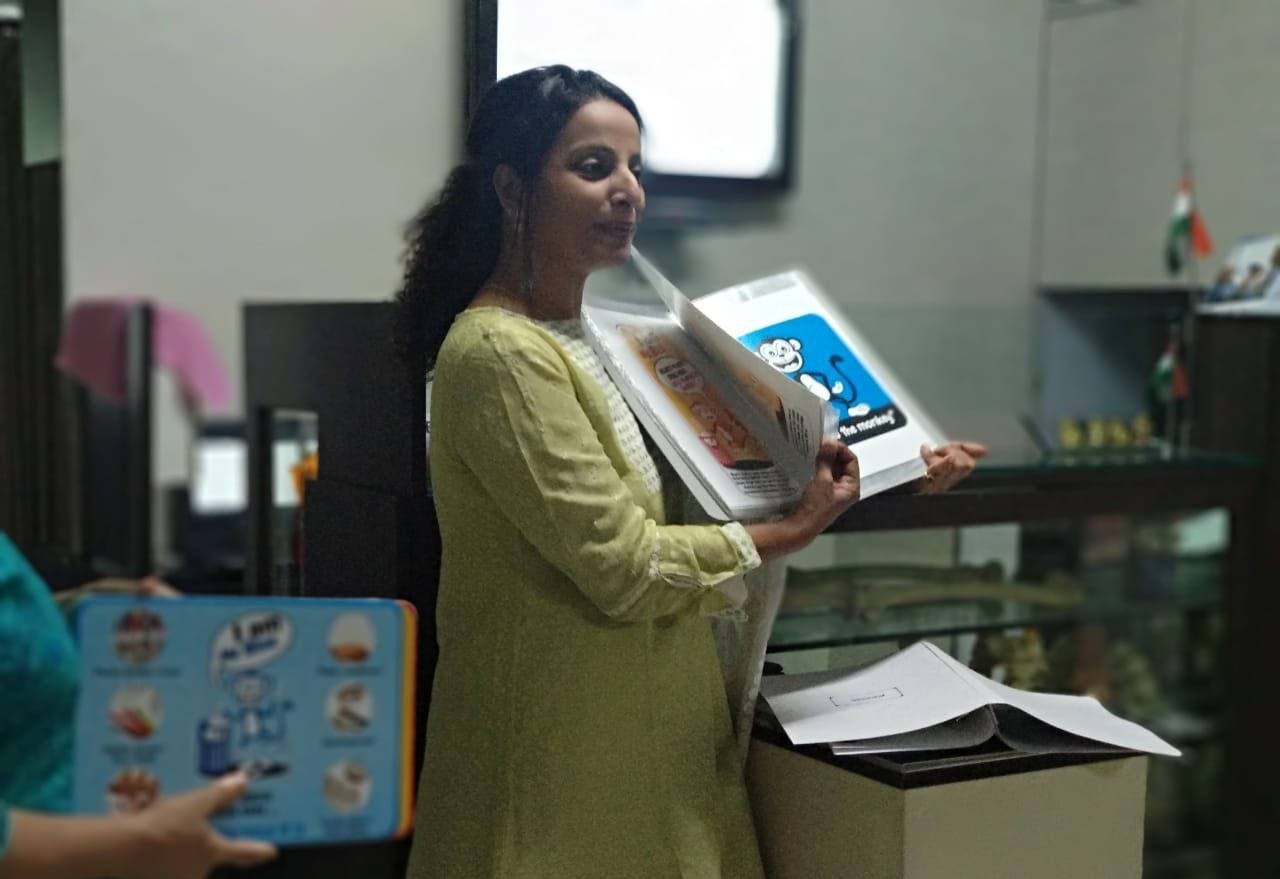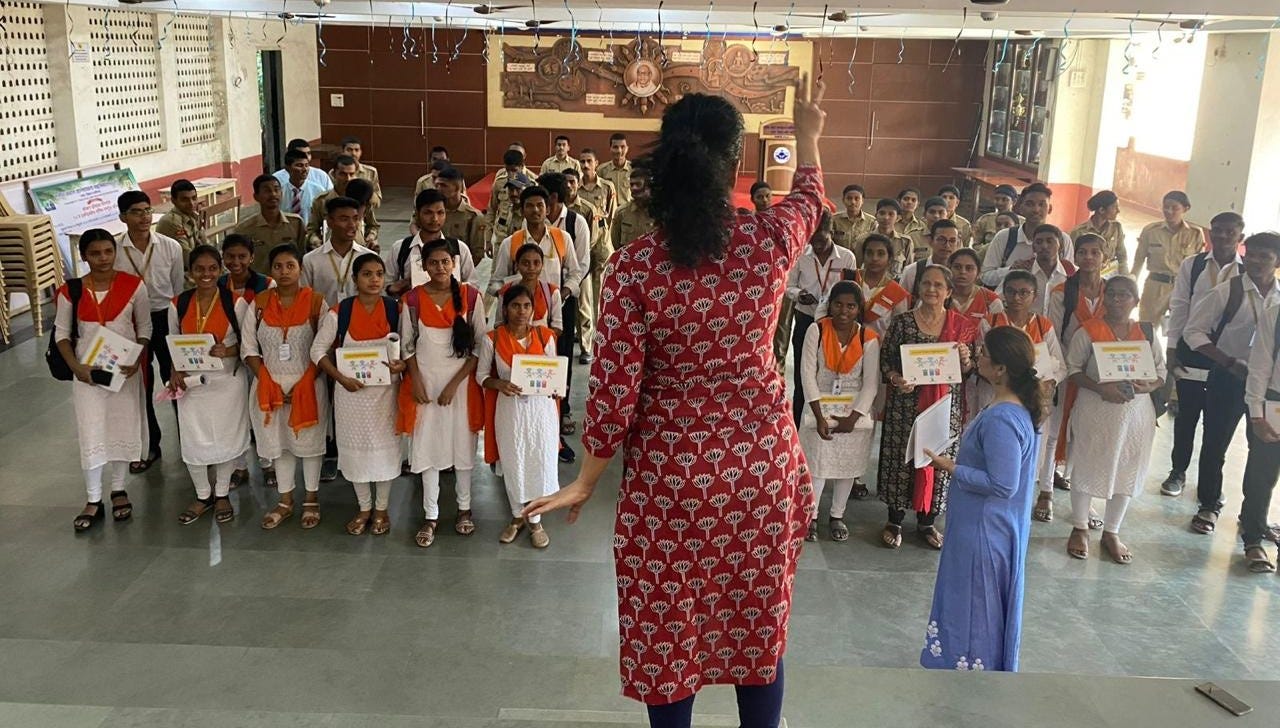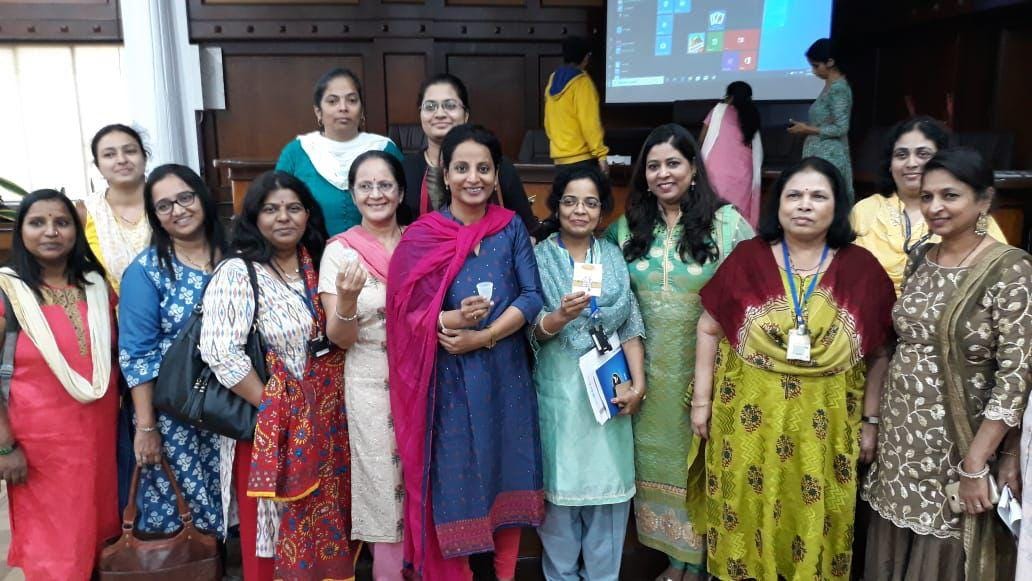This doctor is tackling waste crisis to empower communities toward sustainability.
A practicing surgeon by day and an environmental warrior by passion, Dr. Lata Ghanshamnani is leading impactful waste management initiatives with RNisarg Foundation in Maharashtra.
Snapshot
In 2010, Dr. Lata Ghanshamnani, a practicing ophthalmologist in Thane, Maharashtra, found herself questioning the growing civic challenges in her city. Her turning point came when she decided to take a simple step—segregating waste in her own household—believing it would be enough to make a difference. But what she discovered was far from comforting: downstream systems to manage segregated waste were virtually nonexistent.
This realization sparked a deeper commitment to uncovering solutions, driven by her belief that rights come with responsibilities. “If I want clean air and livable spaces, it’s my duty to act,” she reflects.
With time, her journey evolved from a personal commitment to a broader mission. By 2016, she founded RNisarg Foundation, starting with waste management initiatives that soon expanded to address menstrual hygiene, pharmaceutical waste, and sustainable diets. Combining her medical expertise with a passion for civic duty, she has empowered thousands of students, women, and citizens to take ownership of their waste, health, and environment.
Dr. Lata’s work is proof that small, thoughtful actions can lead to big, meaningful change.
For the detailed account of Dr. Lata’s journey, please check out the Deep Dive Full Story section.
Impact at a glance
40,000+ students educated on waste management through the Zero Waste Schools program.
25,000 women transitioned to menstrual cups, eliminating millions of sanitary pads annually.
2,000 kilograms of pharmaceutical waste safely collected and diverted from landfills.
5,000 households trained to segregate waste, diverting 2.5 tons of wet waste daily for composting.
With 100% adoption of menstrual cups in tribal communities and 70% in urban areas.
Reduced annual waste in 50+ schools, with each diverting 1-2 tons from landfills.
Achieved national recognition, including the Governor’s Award and a Swachh Saarathi fellowship, Women of substance from KYT, Women4climate cohort member, Thane gurav awardee.
Dive Deeper: Full Story (4 mins read)
In Thane, Maharashtra, RNisarg Foundation is changing how communities manage waste and health. In a conversation with ImpactStories.in, Dr. Lata Ghanshamnani shares her journey, the challenges faced, and how her foundation empowers schools, women, and households to create lasting impact.
When ImpactStories.in spoke with Dr. Lata Ghanshamnani, her commitment to creating livable cities was immediately evident. A practicing ophthalmologist in Thane for 25 years, Dr. Lata’s journey into waste management began with an awakening moment in her 40s.
“I realized that I couldn’t just focus on my family and profession anymore. If I wanted my city to be livable for my children, I had to act,” she shares.
The spark came from a simple act of segregating household waste. “I believed segregation alone was enough,” she says. “But I soon discovered that most of the waste, even if segregated, was being dumped into landfills. There was no system in place to handle it properly.”
This discovery lit a fire in Dr. Lata. “You can’t unsee a problem once you’re aware of it,” she reflects. Determined to make a difference, she began her journey as an advocate for waste management and civic responsibility.
Building the foundation for change
In 2016, Dr. Lata established RNisarg Foundation with the mission to address civic challenges through innovative, community-led solutions. The journey wasn’t easy. As she candidly admits, “Doctors aren’t trained for nonprofit work. We know medicine, not waste segregation or public advocacy.”
She describes the early days of the foundation as a steep learning curve. “I had to learn everything—how to communicate with local government officials, how to educate communities, and even how to manage funds. It was overwhelming, but I believed in the cause,” she recalls.
Her first major initiative focused on working with schools. Through the Zero Waste Schools program, RNisarg Foundation began educating students on segregation, composting, and recycling. “Children are the best ambassadors for change,” Dr. Lata says with a smile. “They bring these lessons home and influence their families.”
Since its launch, the program has reached over 40,000 students and helped more than 50 schools significantly reduce their waste. Each school now diverts between 1 and 2 tons of waste annually from landfills, proving the power of grassroots action.
Tackling menstrual waste head-on
Another critical issue Dr. Lata identified early on was menstrual waste. “Most people don’t realize that sanitary napkins contain plastic and chemicals that take centuries to decompose. One woman can generate thousands of pads as waste in her lifetime,” she explains.
To combat this, RNisarg Foundation began promoting menstrual cups, a reusable alternative that can last up to seven years. The initiative started in tribal areas, where adoption rates were as high as 100%. “In rural and tribal communities, women were surprisingly open to making the switch once they understood the benefits. It was in urban areas, among the privileged, that we faced more resistance,” Dr. Lata notes.
The foundation’s efforts have empowered over 25,000 women to adopt menstrual cups, eliminating millions of sanitary pads annually from waste streams. Additionally, the project has trained 2,000 community educators to spread awareness.
One success story that stands out to Dr. Lata is that of Meera, an Asha worker in a remote village in Maharashtra. “Meera was hesitant at first, but she became one of our most vocal advocates. Today, she has trained over 500 women in her village to switch to menstrual cups,” Dr. Lata proudly shares.
Cleaning up pharmaceutical waste
In a city like Thane, pharmaceutical waste presents another significant challenge. Medicines, in all forms - tablets, syrups, ointments either expired,damaged or unwanted often find their way into landfills, polluting soil and water.
To address this, RNisarg Foundation launched the Green Pharmacy project, installing dedicated bins for households to safely dispose of unused or expired medicines. Over the last three years, the initiative has collected more than 2,000 kilograms of pharmaceutical waste from 10,000 families.
“People don’t think twice about throwing pills or syringes in the trash, but these substances are incredibly toxic. It’s a hidden problem that we’re trying to bring to light,” Dr. Lata says.
Inspiring sustainable lifestyles
Beyond waste management, Dr. Lata advocates for lifestyle changes that have far-reaching benefits. One of her key initiatives promotes a shift to plant-based diets. “Your food choices don’t just impact your health—they have a massive environmental footprint,” she explains.
Citing studies that link animal agriculture to deforestation and climate change, she urges individuals to consider the broader implications of their meals. “If there’s one change anyone can make today that will have the greatest impact, it’s moving toward a plant-based diet,” she emphasizes. “Your food choices have a massive impact on the environment. Switching to a plant-based diet is one of the most effective ways to reduce your carbon footprint.”
“If there’s one change anyone can make today that will have the greatest impact, it’s moving toward a plant-based diet. Your food choices have a massive impact on the environment. Switching to a plant-based diet is one of the most effective ways to reduce your carbon footprint.” - Dr. Lata Ghanshamnani
The journey ahead
Despite the foundation’s many successes, Dr. Lata remains candid about the challenges. “The scale of the problem is immense, and we’re doing too little, too late. Climate change isn’t waiting for us to catch up,” she says.
However, she is optimistic about the power of collective action. “Everyone can contribute in their own way. You don’t have to start an NGO—you just need to start at home. Segregate your waste, use sustainable products, and inspire those around you,” she advises.
Dr. Lata’s work with RNisarg Foundation has not gone unnoticed. From the Governor’s Award to a Swachh Bharat fellowship, the recognition has helped amplify her message. But for her, the true reward lies in the impact. “Seeing a community transform its habits, or a child teaching their parents about segregation, is what keeps me going,” she says.
A legacy of change
As she reflects on her journey, Dr. Lata leaves readers with a powerful thought: “We often think someone else will solve the problem, but change starts with us. Small steps can lead to big transformations.”
Her efforts demonstrate that even in the face of systemic challenges, individuals can inspire meaningful progress.
For more insights into Dr. Lata’s journey, check out the Make an Impact section below
Make an Impact
Explore: Learn and explore more about their mission and projects by visiting their website: www.rnisargfoundation.com.
Follow Dr. Lata on social media: Stay updated and engage with their work on
Explore programs and get involved:
Start small: Segregate waste at home, educate your community, or switch to sustainable products like menstrual cups.
Switch to a plant-based diet: One simple change in your food choices can drastically reduce your carbon footprint, improve your health, and contribute to a sustainable planet.
Spread the word: Share this article to inspire others and amplify the impact of RNisarg Foundation’s work.
Message from the Founder
If this story resonated with you and you appreciate my efforts in bringing such inspiring stories to light, I would be truly grateful for your support. Your contribution will help me continue uncovering and sharing real stories that are driving change across India.
Sincerely,
Abhilash Shah
ImpactStories
Join thousands of subscribers and get exclusive, uplifting stories of people making a difference—delivered straight to your inbox!
We promise not to spam you—just inspiring content.









